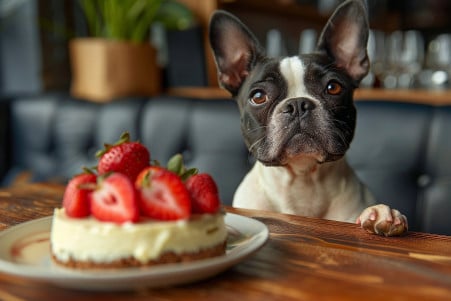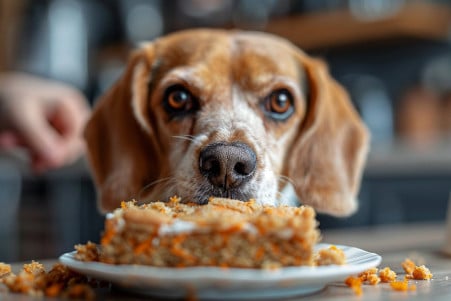Can Dogs Eat Cake? Decoding Canine-Safe Treat Options
25 February 2024 • Updated 24 February 2024

When you’re celebrating a special occasion, cake is often involved, but is it safe to share with your dog? While there are no immediate dangers to dogs from eating a piece of plain cake that doesn’t contain any toxic ingredients like chocolate, most experts recommend against it because of the high sugar and fat content and the potential for allergies.
In addition, many of the additives in human cake can be harmful to dogs. Instead, it’s best to stick to small, occasional treats that are safe for dogs.
In this article, we’ll take a deep dive into the dos and don’ts of what we should and shouldn’t be feeding our dogs by looking at a range of studies from veterinary science, animal nutrition, and pet care experts.
Research by veterinary scientists, animal nutritionists, and pet care experts helps us understand the potential health impacts of some of the ingredients commonly found in cakes and also helps us determine which ingredients are safe and make sure that any treats we give our dogs are part of a nutritionally sound diet for them.
Can dogs eat cake?
Risks of People Cakes for Dogs
If you’re thinking about giving your dog a piece of cake, it’s important to know which ingredients can be dangerous to them. According to PetMD, many of the ingredients in cake, including sugar and fat, can cause a variety of health problems in dogs, ranging from obesity to diabetes.
Meanwhile, Poison Control notes that artificial sweeteners, especially xylitol, are extremely dangerous to dogs and can cause a sudden release of insulin even in small amounts, which can result in hypoglycemia (low blood sugar) and potentially life-threatening issues like liver failure.
Meanwhile, some ingredients that are commonly found in cakes, like chocolate, are well-known to be toxic to dogs and can cause severe poisoning.
In addition, Sit Means Sit Dog Training warns that there are other ingredients, including some nuts, raisins, and spices, that can be toxic to dogs and cause allergic reactions and digestive issues. To be safe, make sure that any cake you give your dog doesn’t contain these toxic ingredients and keep an eye on your dog’s health and dietary needs.
The Bitter Truth: The Role of Sugars and Artificial Sweeteners in Dog Diets
Sugars and artificial sweeteners can have negative impacts on dogs, with xylitol being the most dangerous. The artificial sweetener, which is commonly found in sugar-free products, is highly toxic to dogs. According to the FDA, consumption can result in a rapid release of insulin, leading to hypoglycemia and potential liver failure.
While dogs can enjoy sweet treats, pet parents need to be mindful of the health risks of sugar consumption, including obesity, which affects an estimated 25–30% of dogs, according to VCA Hospitals, and diabetes, which is why it’s important to avoid added sugars in their diet.
Naturally occurring sugars, like those found in fruits and vegetables, are safer because of the fiber that comes with them, which helps control how they are absorbed. Volhard Dog Nutrition suggests that the complex carbohydrates found in whole foods are a better option because they have a slower impact on blood sugar levels.
Dog parents need to be careful and always read labels to make sure they aren’t feeding their dogs any sweeteners that are toxic to them, like xylitol, and instead opt for dog-friendly sweeteners.
While sweeteners like erythritol and monk fruit are safe for dogs in small amounts, the focus should be on limiting the amount of sweeteners dogs consume and instead making sure they are eating a well-balanced diet, as recommended by experts like Dr. Jerry Klein of the AKC.
This approach to dog nutrition takes into account the specific needs of dogs and avoids human-based treats that could be detrimental to their health.
Dog-Safe Desserts: Where to Find Dog Birthday Cakes
Make sure your pup can enjoy their birthday cake by getting them a dog-friendly cake. If you’re a baker, you can make the Pumpkin Dog Cake from Once Upon a Pumpkin, which uses healthy ingredients like pumpkin puree, peanut butter, and applesauce to make a cake that’s safe for both dogs and people. Pumpkin is a superfood for dogs, and it has digestive benefits and can be eaten in small amounts.
For those who would rather buy a cake, NOMYNOMY Pet Bakery and Postman Pooch are two companies that specialize in dog birthday cakes. NOMYNOMY uses human-grade ingredients to make cakes that are free of additives and preservatives, and Postman Pooch offers a range of dog birthday cakes made with digestible flours and sweetened with honey or applesauce.
While these dog-safe options will let you include your dog in the celebration, it’s important to remember that you should still practice moderation. If your dog eats too many treats, it can throw off their balanced diet, which is important for their overall health. Make sure you only give them these special treats occasionally to make sure they stay healthy and happy.
Knowing What Dogs Need
According to an overview by VCA Animal Hospitals, a dog’s diet needs to include a variety of proteins, fats, carbohydrates, vitamins, minerals, and water to make sure they are as healthy as possible. On the other hand, human cakes are full of sugar and don’t have the nutrients dogs need. This can lead to an unbalanced diet, an increased risk of obesity and diabetes, and a disruption of the dog’s nutritional needs.
WebMD suggests that you make sure that the treats you give your dog are in line with their nutritional needs so that they can be a healthy part of their diet. This means that they should make up no more than 10% of the dog’s daily calories.
It’s important that the treats are both in moderation and nutritionally complete, although you can also talk to your vet or look for recipes that are “complete and balanced.”
PetMD stresses the importance of making sure that a dog’s diet is balanced and meets their needs based on their age and other factors. This is important for making sure that a dog is healthy. Make sure that you talk to a veterinary healthcare team to make sure that you are being a responsible pet owner and that you are adding treats to your dog’s diet in a healthy way.
A Final Bark About Cakes and Canine Health
So, while the image of a dog hungrily staring down a slice of cake may pull at the heartstrings, it’s important to remember that it’s best to avoid giving in to the temptation to share.
The ingredients in a typical human cake, from sugar and other sweeteners to potentially toxic substances like xylitol and chocolate, can be dangerous to dogs. We’ve explored how these ingredients can lead to serious issues, such as obesity, hypoglycemia, and liver failure.
Luckily, dog-friendly treats provide a happy, healthy alternative for those special occasions. Pet parents can enjoy their dog’s company and still keep them safe and healthy by choosing from homemade options or commercially available treats that are specifically designed for dogs. That said, these options should be used in moderation and as part of a diet that maintains the balance of a dog’s nutritional needs.
As responsible pet parents, it’s up to us to ensure our furry family members live long, healthy lives by choosing treats wisely and sticking to our commitment to their dietary needs. After all, the best treat you can give your dog is a life that’s long, happy, and healthy.


